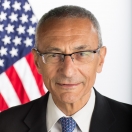
Last Friday, the President spoke to the American people, and the international community, about how to keep us safe from terrorism in a changing world while upholding America’s commitment to liberty and privacy that our values and Constitution require. Our national security challenges are real, but that is surely not the only space where changes in technology are altering the landscape and challenging conceptions of privacy.
That’s why in his speech, the President asked me to lead a comprehensive review of the way that “big data” will affect the way we live and work; the relationship between government and citizens; and how public and private sectors can spur innovation and maximize the opportunities and free flow of this information while minimizing the risks to privacy. I will be joined in this effort by Secretary of Commerce Penny Pritzker, Secretary of Energy Ernie Moniz, the President’s Science Advisor John Holdren, the President’s Economic Advisor Gene Sperling and other senior government officials.
I would like to explain a little bit more about the review, its scope, and what you can expect over the next 90 days.
We are undergoing a revolution in the way that information about our purchases, our conversations, our social networks, our movements, and even our physical identities are collected, stored, analyzed and used. The immense volume, diversity and potential value of data will have profound implications for privacy, the economy, and public policy. The working group will consider all those issues, and specifically how the present and future state of these technologies might motivate changes in our policies across a range of sectors.
When we complete our work, we expect to deliver to the President a report that anticipates future technological trends and frames the key questions that the collection, availability, and use of “big data” raise – both for our government, and the nation as a whole. It will help identify technological changes to watch, whether those technological changes are addressed by the U.S.’s current policy framework and highlight where further government action, funding, research and consideration may be required.
This is going to be a collaborative effort. The President’s Council of Advisors on Science and Technology (PCAST) will conduct a study to explore in-depth the technological dimensions of the intersection of big data and privacy, which will feed into this broader effort. Our working group will consult with industry, civil liberties groups, technologists, privacy experts, international partners, and other national and local government officials on the significance of and future for these technologies. Finally, we will be working with a number of think tanks, academic institutions, and other organizations around the country as they convene stakeholders to discuss these very issues and questions. Likewise, many abroad are analyzing and responding to the challenge and seizing the opportunity of big data. These discussions will help to inform our study.
While we don’t expect to answer all these questions, or produce a comprehensive new policy in 90 days, we expect this work to serve as the foundation for a robust and forward-looking plan of action. Check back on this blog for updates on how you can get involved in the debate and for status updates on our progress.


